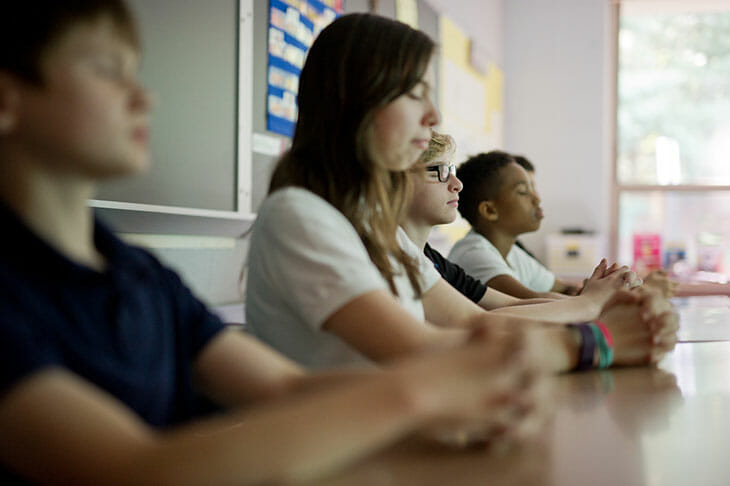Frankie Engelking, Director of Mindfulness & Service Learning 2023
Why Are Mindfulness School Programs Important in Your Child’s Life?

School is a place where students learn, make friends, and overcome challenges. However, common stressors can interfere with academic and social success, and in some situations make it nearly impossible for students to be available for learning. From stress associated with tests and deadlines, to classroom distractions, or thinking about the Friday night basketball game, there can be a lot of factors that make it difficult for a student to be present in the moment.
Integrating mindfulness into the classroom is an effective way to help students become more aware of their thoughts, feelings, and surroundings, and learn how to manage academic stress and increase focus in school and life. Let’s take a deeper look at why mindfulness school programs can be important in your child’s life, especially for bright children, including those with dyslexia, anxiety, ADHD, or organizational challenges.
What Are Mindfulness Programs?
In a mindfulness school program, structured lessons are still at the core of the curriculum. Students are participating in academic classes while a rotating school-wide theme helps them focus on foundational principles of mindfulness such as awareness, gratitude, positive thinking, and empathy.
As students live and breathe Mindfulness principles on a daily basis, they begin to integrate them into their learning and their understanding of themselves. This combination of academics and emotional regulation allows students to better understand who they are and what they can accomplish. Mindfulness programs can reduce stress and build confidence both in and out of the classroom. In the long-term, it can help students to develop resilience, competence, and confidence which are important for success both during and after high school.
Mindfulness programs combine the best of academia and personal awareness to empower students to take on new opportunities and explore new passions. There’s always something new to learn, do, or discover that also serves a higher purpose of helping students be their best selves.
Benefits of Mindfulness
A stronger sense of self and improved control of the nervous system are only a few of the benefits of mindfulness programs, here are several more:
Improved Emotional Intelligence – According to Teacher Cast, mindfulness helps students improve their emotional well-being, learn how to work well with others, and enhance their communication skills. As they experience Mindfulness activities, students develop a deeper understanding of their own emotions and others. All of this can enhance a student’s emotional intelligence!
More Self-Advocacy – In a mindfulness program, students take ownership of their actions and emotions. This improves their personal accountability and self-advocacy skills that are essential to have after graduation. Life can sometimes be overwhelming, but by acknowledging these feelings and understanding why they exist, children can begin to manage them and find their voice as they speak up for what they need.
Increased Confidence – Students develop an increased level of self confidence in their capabilities, which is important as they navigate school, life, and future career paths. Our curriculum helps students prepare for college and beyond. Not only are they learning valuable, tangible, skills, but they are also advancing their interpersonal and communication skills that employers (and college admissions) value.
Enhanced Attention – Time and time again, studies show that mindfulness can help students improve their attention. This contributes to significant improvements in classroom performance. Staying focused can be difficult for students for many reasons, including classroom distractions, test anxiety, or ADHD. Mindfulness programs teach students effective activities (such as deep breathing) that settle their mind, calm their body, and improve their concentration.
Refining these skills is beneficial for every student, but can be especially helpful for students with dyslexia, anxiety, ADHD, or organizational challenges.
Mindfulness Training in Action
This social and emotional learning is accomplished through an array of interactive activities and training. The key to many of these practices is that they engage the majority of a student’s senses and strike a balance between internal reflection and making external connections.
For instance, a popular activity that is a beneficial practice for anyone regardless of age is mindful walking. Take a stroll down your favorite path in the woods or explore somewhere new (like a street you’ve never been down). Be purposeful as you notice your surroundings; the sights, sounds, and feel of the outdoors. This can help to clear your mind and lower your stress by focusing on the experience of walking while connecting with your surroundings.
In mindfulness school programs, these activities also have educational aspects. Learning about the human body can be accompanied by breathing exercises to help students understand how our lungs work alongside the benefits of deep breathing. Creating gratitude rocks (another popular mindful activity in school) improves empathy but also encourages students to practice their handwriting and creativity.
There are even some easy mindfulness activities that you can do at home!
McLean School: A Mindful Community
At McLean School, we understand students first for what they can do, not for what they can’t do. Our comprehensive mindfulness school program helps students realize their full potential with a college-preparatory curriculum that is traditional without being rigid, challenging without being intimidating, and designed with the real world in mind.
Want to learn more about our unique approach to mindfulness? Request more information today or schedule a free in-person or virtual tour–we’re looking forward to hearing from you.
– Frankie Engelking, Director of Mindfulness & Service Learning 2023